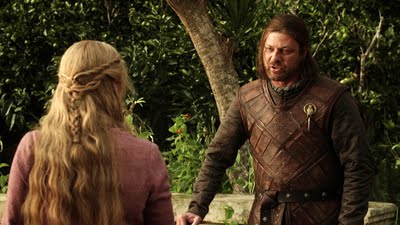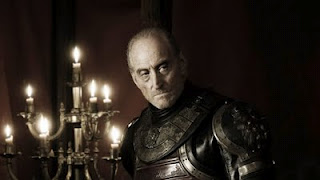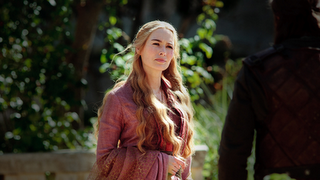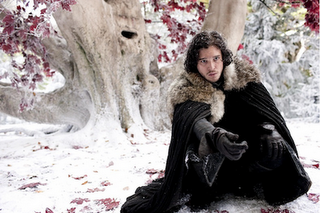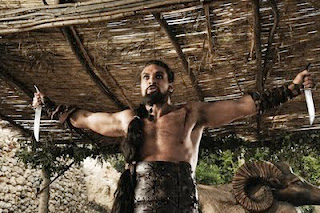Things are hotting up in Westeros but Kieran Mathers wonders just how far a show should go to keep its audience interested. Perhaps the Starks just need a brisk walk…
An awful lot of Game of Thrones is exposition. It’s not a police procedural, after all, and the world has to be defined through dialogue as there is little else to relate it to an unfamiliar audience. Disguising this exposition is one of the hardest tricks for a writer to pull off. One solution is to have a distraction or a gimmick to make such scenes more visually interesting. TV is a visual medium and has been taking advantage of this for a long time.
A great example of this is The West Wing. To keep expository scenes interesting, writer Aaron Sorkin made the characters walk. It didn’t matter where they were walking, just that the dialogue had some action to it. He later admitted the only reason he had done this is to stop characters talking to each other statically, and in the process created a new verb: ‘To sorkin’ – the act of walking fiercely in one direction while holding a rapid-fire conversation. Intelligence and a good sense of direction is required.
However, Game of Thrones has discovered something different in the form of visual gimmicks: noble butchery and … sigh … lesbian tryouts. I wish I were kidding.
The first scene involves the butchering and skinning of a stag by Jaime Lannister’s father, Tywin (Charles Dance). It’s a pretty clumsy visual metaphor, since the stag is the symbol of the Kings house, Baratheon. It could also work on another level to show the power of the Lannisters over the Seven Kingdoms, as they can kill and gut the realm if they so wish, and may even do so with their large army. It also demonstrates that Tywin is willing to get his hands dirty should he need to.
Despite all this, it didn’t work for me. Tywin Lannister, the leader of the most powerful house in Westeros, would not butcher his own meat. He’s got butchers to do that for him. The other important thing to remember is that, as we will see from Tywin in the future, he is a man who prefers his bloody hands at arm’s length. He’s not King Robert, relishing the sensation of each kill. Such behaviour would demean him, and I think this was a fundamentally flawed method of introducing the character. It did not give the right impression at all, unless this adaptation is going to take massive liberties with the character in future. It’s good to see the arrogant Jaime Lannister (Nikolaj Coster-Waldau) again though.
The lesbian sex falls into the same trap. We already know that Littlefinger is a cunning fellow, aiming to manipulate everyone until he gains power. We already understand his methods of deceit because we’ve seen him as a spy-master, arguing with Lord Varys. We already know about his famous duel for Catelyn Stark and the injury it did him, because it was mentioned in a previous episode at some length. If you haven’t realised the depth of his ambition by now then you definitely haven’t been watching closely enough. So most of his exposition in this scene is irrelevant, leaving us with two erotic ladies and little else; in short just a cheap excuse for more gratuitous sex and nudity.
The worst part of this is the clumsy foreshadowing it gives the shock end of the episode. It makes clear Littlefinger’s approach, which did not need to be spelt out so obviously and I would imagine that a spoiler-free audience could have guessed what was going to happen.
Lena Headey as Cersei Lannister is a bit of a waste, her performance sadly one-note throughout the episode. I understand that she is meant to be mannered, cunning and relatively deep, but little of that is expressed in her acting. She just comes across as stolid and un-expressive, lacking in emotion and concern. That was a disappointment, especially considering the pathos she had developed through the previous episodes.
Sean Bean is turning into a little bit of a problem for the audience. To understand Ned Stark’s motivation you must understand his honour, his doggedness to do the ‘right’ thing as he sees it. Unfortunately, because we do not know how this has come about, he just looks stubborn and absurd. Honour, as it is understood in Westeros, needs to be better defined. All the other characters – Jon Snow, Paeter Baelish, even minor ones such as the Mountain and the Hound – have or will have origin stories that lay out their motivation accordingly, so the lack of exposition for Ned Stark is especially frustrating!
After their noticeable absences last week, the Dothraki and the Night’s Watch make a belated and appreciated return. Jon Snow (Kit Harrington) successfully makes his vows to join the Brotherhood, ably assisted by Samwell Tarly (John Bradley-West). The two continue to grow in their relationship and this actually brings out Kit Harrington’s range rather well. I think that his reserve is not a weakness of his acting but a definite decision, and while this lacks immediate impact it does make the moments of true emotion much more noticeable. This is ably contrasted by the jovial Sam, who is very similar to the character I had always imagined. He’s a very useful foil for the seriousness of the piece, especially when teamed with Grenn, the other boy in the Night’s Watch. Once more it’s great to see the minor actors get their moments. It puts pay to any form of whining!
Jason Momoa’s Khal Drogo has been impressive throughout the series, bringing a muscular expression to the part but he’s never really been called upon to demonstrate his more war-like side until now. Spurred on by the developing plots set in motion in Westeros, we finally get to see Drogo, the undefeated horse lord, screaming defiance at all ahead of him. It’s a real hairs-on-the-back-of-the-neck moment, but it is only so effective because of what we have seen before. His gentle relationship and quieter moments with Daenerys show him in a more forgiving light. The dramatic contrast between that and his bestial anger is powerful, for you finally realise what a great and terrible man Daenerys is about to unleash upon the Seven Kingdoms. But, like all other characters, he is definitely a man rather than an archetype.
Equally, Emilia Clark plays both Daenerys’ building authority and ultimate naiveté very well indeed. She is growing to be a queen but does not yet seem to realise what she is asking for. At the end of the episode, it is quite clear she has both convinced Drogo of her plans and fallen under his spell; the muscular warlord as charismatic as he is lethal, boasting of the rape, slaughter and plunder he will do in her name. It also points to a ruthlessness which we have not yet seen in Daenerys, for she is about to plunge Westeros into war for her ‘right’ to rule. Ruthlessness and naiveté are a dangerous combination, and it will be good to see if that can be tempered with mercy in the future. Otherwise, what goodwill Dany has created in our minds by escaping her brother’s abuse will be lost in a great wave of bloodshed.
So now the massacres are about to begin, and no-one is safe unless they start working together. Not looking very likely at the moment…

